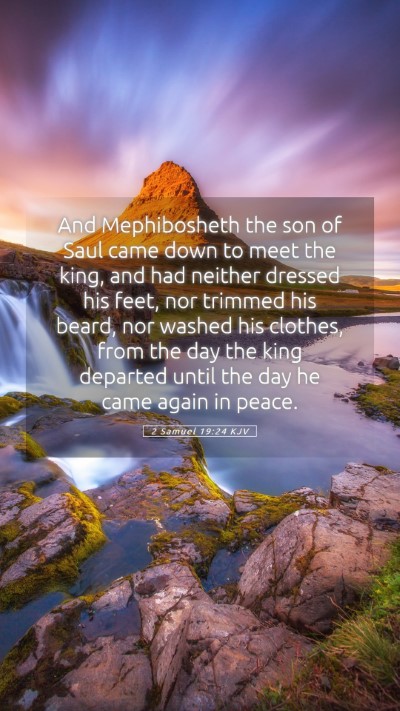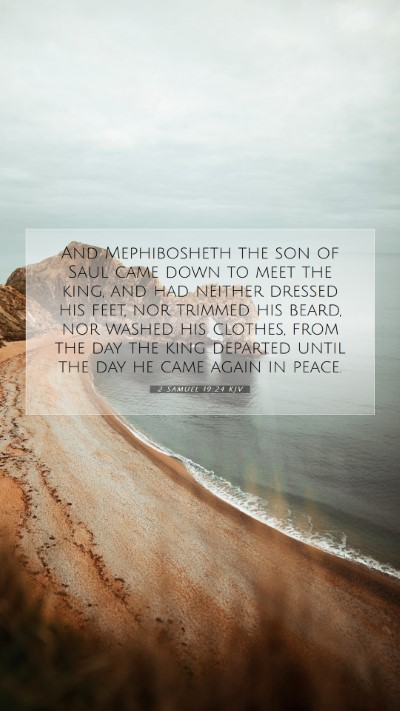Understanding 2 Samuel 19:24: A Comprehensive Commentary
The Bible verse 2 Samuel 19:24 reads: "And Mephibosheth the son of Saul came down to meet the king, and had neither dressed his feet, nor trimmed his beard, nor washed his clothes, from the day the king departed until the day he came again in peace."
This passage encapsulates a rich narrative filled with themes of loyalty, honor, and the consequences of political turmoil and reconciliation. Here, we explore the profound meanings of this verse through various biblical commentaries.
Verse Analysis and Context
In exploring the meaning of this Bible verse, we take into account the historical and personal context surrounding Mephibosheth and King David. Matthew Henry notes that Mephibosheth, as the grandson of Saul, held a precarious position during the political upheaval that followed Absalom’s rebellion. His physical condition, being lame, adds to the tragedy of his situation.
Albert Barnes emphasizes the gravity of Mephibosheth’s actions during David's absence. His neglect in personal grooming signifies mourning and distress, which reflects his loyalty and despair over the king’s situation, indicating his true feelings and solidifying his allegiance to David despite the tumultuous circumstances.
Adam Clarke further elucidates the implications of Mephibosheth's unkempt appearance, suggesting it symbolizes a deeper emotional state. This lack of self-care indicates not only mourning for David's absence but also a rejection of the self-serving opportunities that might have arisen during the king's exile.
Key Themes in 2 Samuel 19:24
- Loyalty and Friendship: This verse reveals Mephibosheth’s unwavering loyalty to David, emphasizing the bond of friendship that exists even amidst political strife.
- Signs of Mourning: His appearance serves as an outward expression of grief and loyalty, suggesting that his devotion to David transcends mere political allegiance.
- The Importance of Forgiveness: The reunion between David and Mephibosheth underscores themes of reconciliation, forgiveness, and the restoration of relationships that were strained by conflict.
Practical Applications
Understanding 2 Samuel 19:24 can provide valuable insights for modern readers:
- Commitment in Relationships: Just as Mephibosheth remained committed to David, we are called to remain loyal to our friends and loved ones, especially in their times of need.
- Expressing Grief: It is important to acknowledge and express our feelings in healthy ways during times of loss or disappointment.
- Seeking Reconciliation: This verse encourages the pursuit of reconciliation after disputes, reminding us of the importance of restoring relationships.
Cross References
- 2 Samuel 9:1-7: The account of David's kindness to Mephibosheth and his restoration to Saul’s estate.
- 2 Samuel 16:3: Mephibosheth’s loyalty is questioned amidst the political unrest.
- 2 Samuel 17:27-29: Other individuals supporting David during the rebellion, highlighting themes of loyalty.
Conclusion
In conclusion, the verse 2 Samuel 19:24 offers a glimpse into the emotional and relational dynamics of the time. The interpretations provided by public domain commentaries enhance our understanding of the significance of loyalty and mourning, while prompting reflection on how these themes manifest in our own lives. As one engages in bible study insights and biblical exegesis, verses like this remind us of the enduring lessons found in Scripture.
Further Bible Study Resources
For those seeking deeper understanding, consider utilizing various bible study tools and bible study guides. Engaging with online bible study platforms and bible study courses can further aid in grasping difficult passages and enhancing your bible study lessons.


